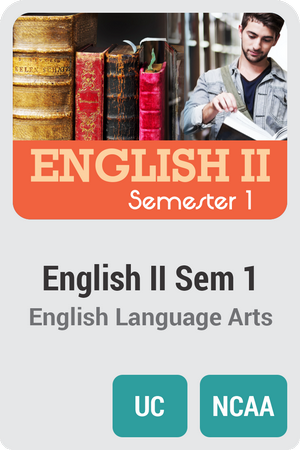
Course Overview:
Through a variety of informational texts, this course supports students’ ability to understand complex texts through evaluation and analysis. To accomplish this objective, students will explore theme, word meaning, and formal language as they evaluate texts such as seminal U.S. documents, presidential addresses, and functional workplace documents.
Selections for this course include essays by Thoreau; speeches by Frederick Douglas, Ronald Reagan, and Mahatma Gandhi; Lincoln’s Second Inaugural Address, and Martin Luther King, Jr.’s Letter from a Birmingham Jail.
This course also guides students in discerning how a subject is represented in various mediums and why it is important to gain information from various mediums to enhance one’s understanding of a subject. To facilitate this goal, a variety of texts, videos, and images depicting the life of Helen Keller are used.
Students continue to build grammar and reading comprehension skills through a variety of writing assessments and relevant reading comprehension passages, respectively.
Note: This course is not designed for ELL (English Language Learners) students. ELL students may enroll in this course ONLY if they have adequate mentor support at their home school and are able to fulfill all course requirements.
Prerequisites:
Note: This course is not designed for ELL (English Language Learners) students. ELL students may enroll in this course ONLY if they have adequate mentor support at their home school and are able to fulfill all course requirements.
Syllabus:
Section 1: Reading Fundamentals: Informational Text
In this unit, you will learn about the following objectives:
- Determine and Analyze the Theme of an Informational Text
- Interpret Words and Phrases Used In an Informational Text
- Understand How and When to Use Formal Language
- Understand the Use of Text Features in Functional Workplace Documents
- Analyze Similar Themes in Two Different Informational Texts
- Compare How Different Authors Approach Similar Themes In an Informational Text
Lessons:
- Theme
- Words and Their Meanings
- Using Language in a Formal Context - Part 1
- Using Language in a Formal Context - Part 2
- Using Language in a Formal Context - Part 3
- Similar Themes - Part 1
- Similar Themes - Part 2
Section 2: Individuals & Events: Informational Text
In this unit, you will learn about the following objectives:
- Understand How Individuals Influence a Text
- Analyze How Events Develop and Interact Over the Course of a Text
- Determine How an Author Unfolds Events in a Text to Convey a Message
- Discover an Author’s Perspective and Purpose in a Text
- Evaluate Rhetorical Devices in a Text
- Determine Explicit Information in a Text
- Make Logical Inferences from a Text
- Cite Textual Evidence to Support Your Conclusions and Claims from Inferencing
Lessons:
- Individuals - Part 1
- Individuals - Part 2
- Lincoln’s 2nd Inaugural Address
- "Letter from a Birmingham Jail" - Part 1
- "Letter from a Birmingham Jail" - Part 2
- "Letter from a Birmingham Jail" - Part 3
- Perspective
- Inferencing
Section 3: Argument & Rhetoric in Informational Text
In this unit, you will learn about the following objectives:
- Delineate and Evaluate the Argument and Specific Claims in a Text
- Evaluate the Validity of the Reasoning and Support for Evidence in a Text
- Assess How Point of View or Purpose Shapes the Content and Style of a Text
- Analyze How an Author Uses Rhetoric to Advance their Point of View, Perspective, or Purpose
- Identify False Statements and Fallacious Reasoning in a Text
Lessons:
- Argument and Claims
- Point of View
- Author Claims
- Richard Nixon’s “Checkers” Speech
- Ethos, Pathos, Logos - Part 1
- Ethos, Pathos, Logos - Part 2
Section 4: Introduction to Representations in Media - Helen Keller
In this unit, you will learn about the following objectives:
- Integrate and Evaluate Content that is Presented in Diverse Media and Formats
- Analyze Various Accounts of a Subject in Different Mediums
- Determine Which Details are Emphasized in Each Representation
- Analyze Different Representations of a Subject in Key Images with Attention to Elements that are Emphasized or Absent
- Analyze Representations in Mediums that Include Film, Newspaper Articles, Historical Texts, and Artistic Renderings
Lessons:
- Exploring Multiple Sources of Information
- Autobiography and Film Analysis - Part 1
- Autobiography and Film Analysis - Part 2
- Autobiography and Film Analysis - Part 3
- Newspaper and Video Analysis
- Helen Keller Biography by John Hitz
- Helen Keller Biography by Rebecca Deming Moore
- Helen Keller's Journal
- Essay on Optimism by Helen Keller
- Play - The Miracle Worker
- Conclusion
Section 5: Understanding Complex Text
In this unit, you will learn about the following objectives:
- Determine Theme and Analyze its Development Over the Course of the Text
- Analyze How an Author Unfolds an Analysis or Series of Ideas or Events and Draws Connections between Them
- Determine the Meaning of Words and Phrases in a Text and Analyze the Cumulative Impact of Specific Word Choices on Meaning and Tone
- Cite Evidence to Support What the Text Says Explicitly and Implicitly
- Analyze in Detail How an Author's Ideas or Claims are Developed
- Determine Author's Point of View or Purpose
- Analyze the Use of Rhetoric to Advance an Author’s Point of View or Purpose
- Evaluate and Assess the Validity of an Argument
- Identify Fallacious Reasoning
Lessons:
- Intro and Overview
- Adam Smith Wealth of Nations
- Karl Marx Capital
- Ayn Rand Capitalism: The Unknown Ideal
- John Kenneth Galbraith The Affluent Society
- Milton Friedman Capitalism and Freedom – Part 1
- Milton Friedman Capitalism and Freedom – Part 2
- Conclusion


